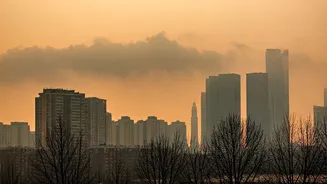Air Quality Crisis
Delhi is grappling with a severe air quality issue, with the Air Quality Index (AQI) plunging to 'very poor' levels. This environmental concern has triggered
the implementation of the Graded Response Action Plan (GRAP) 2. These measures are designed to mitigate the effects of air pollution and protect public health. The Delhi Pollution Control Committee (DPCC) is closely monitoring the situation, as the city faces increasing health risks due to the poor air quality. The measures under GRAP 2 are aimed at improving air quality by controlling various sources of pollution. As air quality continues to deteriorate, the focus remains on the effectiveness of these measures and their impact on the city's residents. The severity of the air quality demands immediate and effective action to safeguard the well-being of the population.
GRAP 2 Implementation
The enforcement of GRAP 2 signifies a critical stage in managing Delhi's air pollution crisis. This stage involves a range of measures, including stricter controls on construction activities, enhanced public transportation, and increased monitoring of pollution sources. The DPCC's directive for hazardous units to register on the Central Pollution Control Board (CPCB) portal is a crucial step. This move will facilitate better monitoring and regulation of industrial emissions. Under GRAP 2, efforts are focused on curbing emissions from various sources to lower the AQI. This includes stricter enforcement of regulations for vehicles, industries, and construction sites to ensure compliance with emission norms. The coordinated efforts under GRAP 2 aim to provide some relief to Delhi's residents who are facing increased health risks. The successful implementation of these measures is vital to navigate the current air quality challenges.
DPCC's Mandate
The Delhi Pollution Control Committee (DPCC) has taken a proactive stance in addressing the city's air quality concerns. A key directive from the DPCC is the requirement for hazardous units in Delhi to register on the CPCB portal. This action is intended to enhance the regulatory framework by improving oversight of pollution sources and emissions. By ensuring the registration of hazardous units, the DPCC aims to enforce compliance with environmental standards and reduce pollution levels. The DPCC's efforts highlight the government's commitment to tackling air pollution and safeguarding public health. Through stringent monitoring and enforcement, the DPCC's mandate is crucial in implementing GRAP 2 effectively. This initiative reinforces the need for industries to adhere to environmental protocols and for the government to take steps to mitigate the impact of air pollution on Delhi’s environment.













